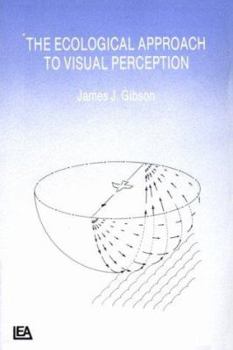The Ecological Approach to Visual Perception
(Part of the Psychology Press & Routledge Classic Editions Series)
Select Format
Select Condition 
Book Overview
This book, first published in 1979, is about how we see: the environment around us (its surfaces, their layout, and their colors and textures); where we are in the environment; whether or not we are... This description may be from another edition of this product.
Format:Paperback
Language:English
ISBN:0898599598
ISBN13:9780898599596
Release Date:October 1986
Publisher:Psychology Press
Length:348 Pages
Weight:1.10 lbs.
Dimensions:0.9" x 6.0" x 9.1"
Customer Reviews
3 ratings
An Eye-Opener...Get it?
Published by Thriftbooks.com User , 13 years ago
This is one of the great works in the fields of visual perception and cognitive psychology. J.J. Gibson was originally an important contributor to the cognitive revolution, which famously attacked Behaviorists for ignoring the reality of internal mental processes. He focused on how animal sensory systems compute information from their environments in meaningful ways, such as a use of "optic flow" patterns of motion to track their heading as they move through their terrain, and a perception of objects dependent upon their possible uses ("affordances"). Later in life, however, Gibson grew frustrated with the standard reductionist approach to visual perception. He felt that certain fundamental aspects of animal perception were being overlooked, and that "retina-centered" models of vision would never address them. Inspired by the German Gestalt psychologists, Gibson began to promote a theory of visual processing that stressed what he felt was essential to perception, leaving the details about physiology by the wayside. He framed visual perception, along with all other sensory modalities, as important only to allow animals to act upon and interact with their surroundings. Perception as information for action, rather than as a passive documentation of external events. For the uninitiated, some of the ideas in this book are way outside of conventional conceptualizations of the world. Let him expound upon his ideas, however, and you'll soon be thinking about your own everyday phenomenological experiences from a fresh and exciting perspective. His writing style is careful and thorough, to the point of sometimes being redundant, but he is nonetheless lucid, accessible, and quite entertaining to read. Another reviewer described this as being a work of Objectivism. Perhaps that argument could be made, but I don't think Gibson himself would care for such talk. This work is all about ecological validity, and "pure" objective truth has little value in the life of most animals (and only a handful of humans at that). Affordances are in the eye of the beholder, and so an "objective" pencil might be perceived as a writing tool for one animal, nest-making material for another, a stabbing weapon for another, and something for a fourth animal to ignore. But I digress... If you are interested at all in the philosophy of agency, visual perception, cognitive psychology, ecological or comparative cognitive studies, definitely try this book. If you like it, and you have questions as to how ecologically tuned perception develops (a topic that this book does not cover), I also recommend his wife Eleanor Gibson's book, "An Ecological Approach to Perceptual Learning and Development." Also accessible, and yet incredibly insightful.
REALY A MUST-HEVE ITEM FOR VISUAL PROFESSIONALS
Published by Thriftbooks.com User , 17 years ago
World is not like some think it is..
This book is for Objectivists
Published by Thriftbooks.com User , 18 years ago
I read this book on the recommendation of Dr. Harry Binswanger from the Ayn Rand Institute after attending his lecture on how people can achieve certainty epistemologically (i.e., how to learn and how to be sure that what you learn is real and correct) by first relying on sensory information. While the subject matter of the book is animals, it makes the case that animals reliably acquire information about their environment through their senses. And since humans are animals too, it follows that humans can place high reliability on the information provided to them by their senses (especially sight). This scientific research provides a good antidote against those who argue that sensory information is inherently unreliable because our sensory organs are either deficient or incapable of adequately gathering information about reality.




